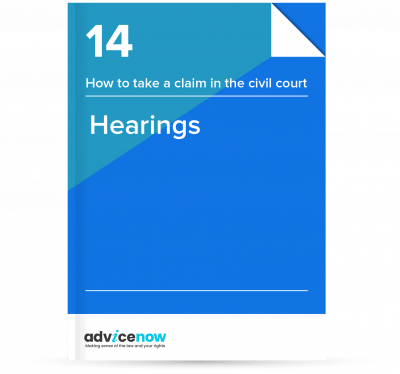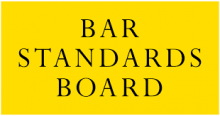Opening submission
Plan how to start or open your case. It is just a few sentences said out loud by you summarising your claim, and what you intend to prove, before you explain what evidence you have got to support your claim. It should take no longer than one or two minutes to say.
In a small claim you may not be expected to make one at all. And in a small claim you will probably stay sitting as the court is more informal.
Who speaks when: the usual order- The Claimant makes their opening submission.
- The Defendant makes their opening submission.
- The Claimant calls their witnesses. Any witness who made a statement is expected to be in court. Their written statement is their evidence which the judge will probably have read in advance. The Claimant has to ask the witness to confirm that their statement is true. If the Claimant wants to ask the witness more questions, or to expand the statement, the Claimant has to ask the judge to give permission.
- The Defendant cross examines the Claimant’s witnesses.
- The Claimant can re-examine their own witnesses about things that came up in cross-examination and which they did not ask questions about the first time.
- The Defendant calls their witnesses.
- The Claimant cross examines the Defendant’s witnesses.
- The Defendant can re-examine their own witnesses about things that came up in cross-examination and which they did not ask questions about the first time.
- The Defendant makes their closing submission.
- The Claimant makes their closing submission.
- The judge decides the case and tells both sides their decision.
- Both sides can put forward their view about what order the judge should make about who should pay the legal costs of the case.
Sometimes it is not clear when each of these things should happen. If in doubt, you can always stand up and say something like ‘Would you like me to call my witness now?’ When someone else speaks, you sit down. When it is your turn to speak again, you stand up. |
Evidence in chief
‘Evidence in chief’ is the phrase used to mean the evidence your own witnesses will give on your behalf.
You might also hear the term ‘direct examination’ or ‘examination in chief’ which are phrases left over from the days when witnesses usually gave their evidence by answering questions.
Giving ‘evidence in chief’ is the process of asking your own witnesses questions so their evidence can be heard by the judge. Both the claimant and the defendant get a very limited chance to do this, as these days witness evidence in chief is mostly done just through written witness statements, rather than witnesses going into the witness box and you asking them questions.
If a witness does answer questions in the witness box, they cannot take anything into the witness box but themselves. They will be given a copy of the trial bundle (which will contain a copy of their statement and all relevant documents). They are expected to be familiar with their evidence and will be asked to confirm that it is theirs, and that they have read it.
Each witness will be asked to swear a religious oath on their chosen holy book or, if they are not religious, to make an affirmation to tell the truth. It is a serious offence to lie in court after swearing an oath or making an affirmation.
If you and your witness are happy with their written witness statement then you just need to ask them to confirm that the content is true. If there are any mistakes or problems with what one of your witnesses has said then it is your only opportunity to deal with this. Get the witness to explain, for example, what the mistake is and why it was made and what the correct position is. It is much better to get this out in the open as soon as possible rather than leave it to the other side to expose it and make it look as though you were hiding something.
The witness statement is treated as that witness’s full evidence. If you want the witness to expand on something in their statement, you will have to ask the judge for permission, and there will need to be a good reason. You will be allowed to ask the witness questions about something that has happened since the witness statements were exchanged. But if you have simply forgotten to include something relevant in the witness statement, then the judge is unlikely to allow you to make up for that at the trial.
Small claims: In a small claim the judge can decide on any way of managing the hearing that he or she considers fair. This might mean the judge decides to question the witnesses directly, before allowing anyone else to. The judge might also decide to limit cross-examination, or not allow it at all.
Top tips- Make sure you and your witnesses are familiar with what you have each said in your statements.
- Make sure you are also familiar with what the other side's witnesses have said in their statements too.
- Give them another read through just before the hearing.
- Make sure you ask questions in a way that your witness understands.
- Take notes or ask a friend to come along to the hearing to do this for you so you can concentrate on what you are going to say.
|
Cross examination
Cross examination is the legal term used to describe the process of asking the other side's witnesses questions. The claimant, the defendant and any other witnesses must all expect to be cross-examined.
You need to think about:
- The questions you are going to ask other people.
- The questions you and your witnesses are likely to be asked by the other side. Put yourself in their shoes. What would you ask yourself if you were them?
The questions you are going to ask other people
Your aim is to bring out the facts that support your own case and weaken the other side's case. Your questions need to relate to liability; the value of your claim and the credibility of their witnesses or evidence.
You usually suggest that something happened differently or that it didn’t happen at all. You may be able to do this, for example, by comparing what the witness says with contrary evidence, for example, in a document or photograph.
You need to do some advance preparation by reading through the other side's witness statements carefully and picking out any problems with what they say. The kind of things you are looking for are points that undermine their case or support your own. Cross examination is your only chance to do this – so do not miss it. Resist the temptation to comment on what the other side's witnesses say in reply to your questions. Leave this for when you make your closing submission.
The questions the other side asks you and your witnesses
You also need to prepare yourself and your witnesses for cross examination by explaining the questions you think it is likely they will get asked. This does not mean you can tell them what to say – you cannot. They have to come up with their own answers. They need to be truthful and answer the questions they are asked and no more.
It is normal for the witness to be referred to specific sections of the trial bundle during cross-examination. If the person cross-examining does not do that, the witness can ask the judge's permission to look at the trial bundle to check a document. This is not a formal process, and so the witness can simply say ‘Please can I look at document X or Y in the bundle Sir / Ma'am?’
Top tipsCross examining others - Ask only one question at a time.
- Do not be rude to a witness or call them a liar. The judge is quite capable of deciding that what a witness is saying is probably wrong without you spelling it out for them.
Being cross-examined - Practise. Get a friend to ask you questions that challenge your version of events, both about what happened, and the value of your claim.
- Ask for honest feedback from your friend. How did your answers sound?
- Try not to get angry when the other side or their representative challenges your version of events. It is their job.
- Listen to the question; take time to reply.
- Say what you want to say – calmly. There is a real temptation to speak too much when you are stressed.
- Try not to use phrases like “to be honest” – it can imply you’re usually not!
- Silence often makes people feel awkward. If there is a gap between the questions you are asked or things just go quiet, don’t feel you have to say something.
- If you genuinely cannot remember something you are asked about, say so. Do not make things up because you feel under pressure.
- If you would like to refer to something in the trial bundle to help you to answer a question, you can ask the judge for permission to do this.
|
Re-examination
Re-examination is the legal word used to describe the process of asking your own witnesses some more questions after they have been cross examined by the other side. The purpose is to give them a chance to explain things that came up when they were questioned by the other side to make sure that the judge is not left with the wrong impression about something. You are not allowed to use re-examination simply to ask things which did not come up in cross-examination but which you forgot to ask first time round.
You are also not allowed to ask your witness leading questions – that is questions posed in such a way that suggest the answer you want them to give.
And remember, unless you know that what your witness will say in answer to your question is going to improve the situation, it may be better to leave things as they are and ask no further questions.
Top tips- Listen to what your witnesses say when they are cross-examined.
- Do not ask your witnesses leading questions.
- Make a note of the points that you might want to pick up in re-examination.
- Keep calm. It is a deliberate part of the process to imply that, for example, your witness is unreliable in some way.
|
Closing submission
This is how you end your case. Both the claimant and the defendant get a chance to make a closing statement to the court. The defendant speaks first and the claimant last.
Usually, the closing submission happens straight after the last witness. If you do not feel ready to make a good job of your closing submission, do not be embarrassed to ask the judge for a little time to collect your thoughts.
However, you can work out most of what you want to say before the trial starts. You have some idea of what the evidence is going to be from the witness statements and documents that you have been sent. You also know what your strongest points are. But you will need to take into account what actually happens in the trial. So, you need to be adaptable and leave room for any changes you want to make on the day.
Focus on the particulars of claim (if you are the claimant) and the defence (if you are the defendant), the evidence given, and the legal arguments that support your case and why you think the judge should prefer your evidence more than the other side. Make sure you cover issues of credibility, liability and value. Highlight any inconsistencies in the other side evidence. You may want to summarise briefly how and why their evidence is less believable than your own and how you have proved your case.
Top tips- Make some outline notes in advance of the trial.
- Use your notes as a reminder list for what you want to say.
- Practise saying what you want to say.
- Get a friend or family member to listen to you. Ask them for their opinion. Do they understand it? Did you speak clearly and simply?
- Remember to add in any points that support your case that have come out as the trial has happened.
- Make sure you have a notepad and pens or pencils with you. Post-it notes can be helpful – allowing you to put notes and markers on the trial bundle as you go along.
|
The judge’s order - judgment
The judge decides who wins and who loses based on whose version of events they prefer and think more believable. The judge then makes an order about what happens as a result of their decision. This is called ‘giving judgment’. The judgment will say who has won and if you won, how much you have been awarded in compensation and interest.
The court will send both sides a copy of the court order in the post.
Once the judge has made their decision, they will deal with the issue of costs, and you need to be prepared to deal with that, whether you have won or lost.
Transcript
If you want a transcript of the judgment, that is the judge's full explanation of why they reached their decision in the case, then you can apply for one by filling out a form and emailing or posting to the court office and paying a fee (unless you are fee exempt).
Costs
As soon as the judge has made their decision and if you have won, you should stand up and say ‘Please can I have my costs’. You need to be assertive and not lose the opportunity to get paid for the time you have spent on your case.
You must get an order for costs to allow the court to assess them. For further information about costs and costs assessment see Legal costs and who pays them.

 This guide was produced by Law for Life's Advicenow project with additional material from
This guide was produced by Law for Life's Advicenow project with additional material from  Thomson Reuters who kindly peer reviewed this updated version.
Thomson Reuters who kindly peer reviewed this updated version.